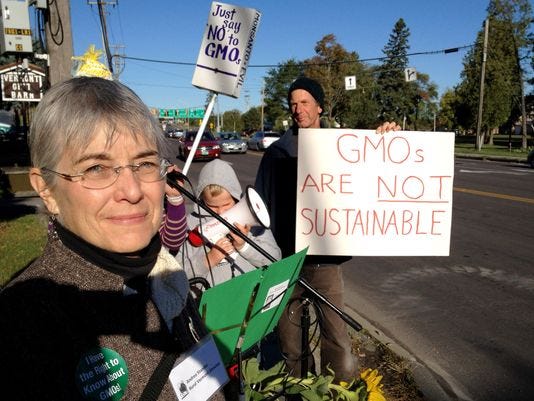04 Apr Tue 2017
Papaya Leaves _ "Good for what ails you"
The good news... Papaya Leaves
Check out "15 Uses for Papaya Leaves - A Powerful Cure for Cancer" on OMTimes Writer's Community
To view this article, visit:
http://community.omtimes.com/profiles/blog/show?id=3288748%3ABlogPost%3A166559
Get your Fresh picked, Organic, Papaya Leaves direct from Back2thebeginning Farm
03 Nov Tue 2015
Are your Eggs really Farm Fresh?
19 Jun Wed 2013
Bravo Conneticut... GMO Labeling
Labels sought for genetically modified food

(Photo: Dan D'Ambrosio, Gannett)
Story Highlights
- More states taking on the issue
- Vermont, Connecticut, Washington have advanced legislation
- Agriculture increasingly turning to genetically altered crops
From Maine to Washington, a growing number of states are taking on the issue of genetically engineered foods, fanning the flames of a decades-old debate about whether the products are dangerous to human health.
This month, Connecticut became the first state to pass a law requiring the labeling of food made from genetically modified organisms (GMOs). In May, the Vermont House passed a similar bill, which will now be taken up by the Senate. Right to Know GMO , a self-described grass-roots coalition with members in 37 states, counts 26 states that have introduced labeling bills.
In Washington state, a referendum on GMO labeling is scheduled for November. by Deal Boat" href="http://www.usatoday.com/story/money/business/2013/06/12/labels-being-sought-for-genetically-modified-food/2417459/#" rel="nofollow">Last November, a referendum in California failed 53-47 after the biotech industry spent nearly $45 million on opposition ads.
At the federal level, Sen. Barbara Boxer, D-Calif., introduced a bill in April – separate from the farm bill – that would direct the U.S. Food and Drug Administration (FDA) to "clearly label" genetically engineered foods. Boxer notes she has 11 co-sponsors of the bill, which she first introduced in 2000. Rep. Peter DeFazio, D-Ore., introduced the House version.
Boxer also attached two amendments to the farm bill, one saying that the United States should join the 64 other nations, including those in the European Union, that have labeling requirements for genetically engineered foods. The other amendment requires a report in six months from several federal agency heads reviewing the labeling methods used internationally, and the "probable impacts" of having differing labeling requirements passed by states rather than a federal standard.
"As more and more states take action, I believe lawmakers in Washington will realize that Congress and the FDA must ensure that all Americans know what's in the food they're eating," Boxer said in an e-mail.
"The companies have such by Deal Boat" href="http://www.usatoday.com/story/money/business/2013/06/12/labels-being-sought-for-genetically-modified-food/2417459/#" rel="nofollow">complete control over who can do independent research into the nature of these things and their impact that we really don't know very much," said Andrea Stander, executive director of Rural Vermont, a non-profit farm advocacy group. "We don't know nearly as much as we should."
The FDA ruled in 1992 that genetically engineered foods are not "materially different" from their traditional counterparts and therefore do not have to be labeled, a ruling opponents of GMOs won't accept.
Monsanto, based in St. Louis, Mo., is a leading supplier of seeds for genetically engineered crops to farmers in the United States and around the world, and a frequent target of protests against GMOs. The company has clearly stated why it is opposed to labeling, saying mandatory labeling "could imply that food products containing these ingredients are somehow inferior to their conventional or organic counterparts."
About 90% of the corn, cotton, soybeans and sugar beets grown in the United States are genetically engineered, according to BIO, the trade group representing Monsanto, Bayer, by Deal Boat" href="http://www.usatoday.com/story/money/business/2013/06/12/labels-being-sought-for-genetically-modified-food/2417459/#" rel="nofollow">Dow, DuPont and other giant firms that dominate the industry.
The modifications to the DNA of seeds, which started in the mid-1990s, fall into two categories: seeds that have built-in genetic resistance to insects, forgoing the need for insecticides, and seeds that tolerate herbicides, making it possible to spray crops, such as soy beans, that are prone to weeds.
Genetic engineering is the fastest growing technology in the history of agriculture, with upward of 17 million farmers around the world using genetically altered seeds, BIO spokeswoman Karen Batra said.
The problem with requiring labels on genetically engineered foods, Batra said, is that they would imply those foods are unsafe.
"In the United States, food packaging labels are reserved to convey food safety information about allergens that might be in a food or to convey nutritional composition," she said. "If the federal government were to mandate by law that a particular food product needed to be labeled that would infer it would be for a safety reason."
D'Ambrosio also reports for The Burlington (Vt.) Free Press
12 Jun Wed 2013
Full Moon Calender
Ute York, in her book "Living by the Moon" says
Plants sown in the correct combination of the best lunar phase and sign show increased vigor, due to having all the best influences. They are growing at an optimum rate and are not as prone to setbacks that would affect less healthy plants. Harvests are often quicker, larger and crops don't go to seed as fast.“The old-time gardeners say, "With the waxing of the moon, the earth exhales. " When the sap in the plants rise, the force first goes into the growth above ground. Thus, you should do all activities with plants that bear fruit above ground during a waxing moon. With the waning of the moon, the earth inhales. Then, the sap primarily goes down toward the roots. Thus, the waning moon is a good time for pruning, multiplying, fertilizing, watering, harvesting, and controlling parasites and weeds” (5)
Shine On Harvest Moon
By Nora Bayes and Jack Norworth (1903)
Shine on, shine on harvest moon
Up in the sky,
I ain’t had no lovin’
Since January, February, June or July
Snow time ain’t no time to stay
Outdoors and spoon,
So shine on, shine on harvest moon,
For me and my gal
Disclaimer:
We don't own the content provided here. If you think this content belongs to you and should be removed from this blog. You just need to give us the original link of your article in comments and it would be deleted / properly credited
|
Full Moon Calendar 2013 |
||
|---|---|---|
| January 26th | Full Wolf Moon | 11:38 pm |
| February 25th | Full Snow Moon | 3:26 pm |
| March 27th | Full Worm Moon | 5:27 am |
| April 25th | Full Pink Moon | 3:57 pm |
| May 25th | Full Flower Moon | 12:25 am |
| June 23rd | Full Strawberry Moon | 7:32 am |
| July 22nd | Full Thunder Moon | 2:16 pm |
| August 20th | Full Sturgeon Moon | 9:45 pm |
| September 19th | Full Harvest Moon | 7:13 am |
| October 18th | Full Hunter's Moon | 7:38 pm |
| November 17th | Full Beaver Moon | 10:16 am |
| December 17th | Full Cold Moon |
4:28 |


